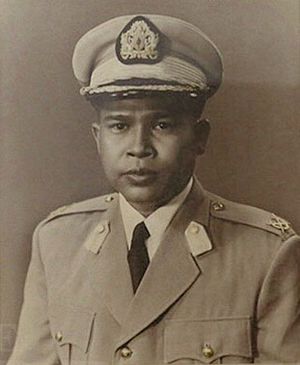Aung Shwe facts for kids
Quick facts for kids
Brigadier General Thray Sithu
Aung Shwe
|
|
|---|---|
|
အောင်ရွှေ
|
|
 |
|
| President of the National League for Democracy | |
| In office 22 December 1990 – 2010 |
|
| Preceded by | Tin Oo |
| Succeeded by | Aung San Suu Kyi |
| Commander of Southern Command | |
| In office 1954–1962 |
|
| Commander of Northern Command | |
| In office 1957–? |
|
| Member-elect of Pyithu Hluttaw (1990) | |
| Preceded by | Constituency established |
| Succeeded by | Constituency abolished |
| Constituency | Mayangon Township № 1 |
| Majority | 66.62% |
| Personal details | |
| Born | 19 May 1919 Rangoon, British Burma |
| Died | 13 August 2017 (aged 98) Yangon, Myanmar |
| Political party | Burma Socialist Party (before 1962) Patriotic Old Comrades' League (1988-?) National League for Democracy (1988–2010) |
| Spouse | Tin Tin Shwe |
| Children | three sons and three daughters |
| Parents | Phoe Con (father) Thein Tin (mother) |
| Military service | |
| Allegiance | |
| Branch/service | Myanmar Army |
| Years of service | 1946–1962 |
| Rank | |
Brigadier General Aung Shwe (19 May 1919 – 13 August 2017) was an important politician from Myanmar (formerly Burma). He was a high-ranking officer in the army, reaching the rank of Brigadier General. He helped start the National League for Democracy (NLD) party. He also led the party for a time when other leaders, like Aung San Suu Kyi, were not able to.
Contents
Early Life and Education
Aung Shwe was born in Rangoon, which was then called British Burma. His parents were Phoe Con and Daw Thein. He studied arts at Rangoon University and graduated in 1940.
During World War II, from 1942 to 1945, he served in the army. He was part of the Burma Independence Army and other groups led by General Aung San. These groups fought during the time Japan occupied Burma. Aung Shwe officially joined the Burmese army in 1945.
Military and Government Career
Aung Shwe was a key military officer under General Ne Win. He helped with the government that was set up in 1958 to manage the country for a short time. He was also a commander in the army. He led the Southern Regional Command from 1955 to 1961. In 1957, he also led the Northern Regional Command.
Before 1962, Aung Shwe was part of the Burma Socialist Party. However, he had a disagreement with General Ne Win about the army's role in the government. Because of this, he had to leave the army in 1961.
After leaving the army, Aung Shwe became an ambassador. He represented Burma in several countries from 1961 to 1975. He served as the Burmese ambassador to France, Australia, Egypt, Spain, and New Zealand. After his time in Australia, he worked in Egypt and then in Paris. He retired from government service in 1975. He then settled in Yangon.
Political Career
In 1988, many people in Burma were unhappy with the government. Public protests started and spread across the country. In response to these events, Aung Shwe helped create the National League for Democracy (NLD) party. He founded it with Tin Oo and Aung San Suu Kyi on 27 September 1988. He was an important leader in the NLD. He also chaired another group called the Patriotic Old Comrades' League.
In the 1990 election in Myanmar, Aung Shwe was elected as a Member of Parliament (MP). He represented the Yangon Region Mayangon Township Constituency No. 1. He also became the chairman of the Committee Representing the People's Parliament (CRPP). This group was made up of candidates who won in the 1990 elections.
Personal Life and Death
Aung Shwe passed away on 13 August 2017. He died at Victoria Hospital in Yangon, Myanmar. He had three sons and three daughters. Their names are Aung Than Shwe, Than Pe Shwe, Aung Myint Shwe, Yuzana Shwe, Myinzu Shwe, and Sabai Shwe.
Images for kids


